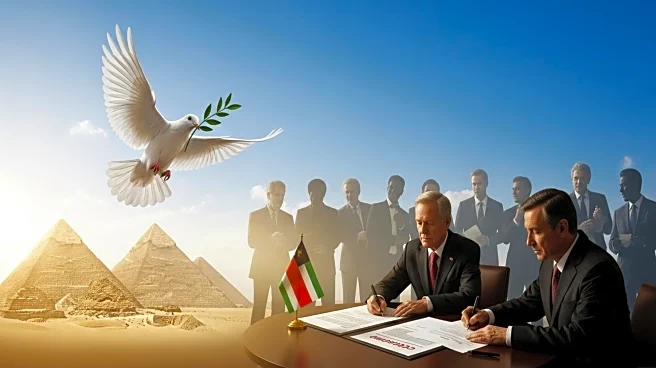What is the story about?
What's Happening?
President Donald Trump joined over 20 world leaders in Sharm El-Sheikh, Egypt, to discuss the future of Gaza following the first phase of the Israel-Hamas ceasefire agreement. The summit included leaders such as Palestinian Authority President Mahmoud Abbas, French President Emmanuel Macron, and British Prime Minister Keir Starmer. The signing ceremony marked a significant step in the ceasefire process, although Israeli Prime Minister Benjamin Netanyahu was absent due to a Jewish holiday. The agreement, brokered by the U.S., involved a prisoner-hostage swap between Israel and Hamas, with emotional reunions occurring in Tel Aviv and Gaza. President Trump emphasized the importance of rebuilding Gaza and hinted at further involvement in the region's post-war development.
Why It's Important?
The ceasefire agreement represents a pivotal moment in Middle Eastern diplomacy, potentially easing tensions in a historically volatile region. The involvement of President Trump and other world leaders underscores the international commitment to peace and stability in Gaza. The agreement could lead to significant humanitarian and economic efforts to rebuild the area, impacting regional politics and international relations. The absence of Netanyahu highlights ongoing complexities in Israeli politics and the challenges of achieving lasting peace. The summit also signals potential shifts in U.S. foreign policy, with President Trump expressing interest in engaging Iran in future peace talks.
What's Next?
The next phase of the peace plan involves extensive rebuilding efforts in Gaza, with President Trump indicating that this could be the easiest part of the process. The U.S. may play a significant role in shaping post-war Gaza, although details remain unclear. President Trump has also set his sights on Iran, suggesting that lifting sanctions could be possible if Iran engages in peace talks. The international community will likely monitor these developments closely, with potential implications for regional stability and U.S.-Iran relations.
Beyond the Headlines
The ceasefire agreement could have long-term implications for Middle Eastern geopolitics, potentially altering alliances and power dynamics. The focus on rebuilding Gaza may lead to increased international aid and investment, impacting local economies and infrastructure. Ethical considerations arise regarding the treatment of prisoners and hostages, as well as the broader humanitarian impact of the conflict. The agreement may also influence cultural perceptions of peace and conflict resolution in the region.















